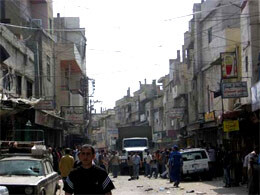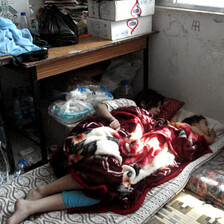Lebanon 23 May 2007
The following interview with Ashraf Abu Khorj, a youth organizer, was conducted on May 21 at around 3pm as the Lebanese Army was shelling the Nahr al Bared refugee camp:

Nahr al-Bared Refugee Camp (UNRWA)
For the past two days, and since 4 am this morning, there have been lots of attacks. Homes attacked. Homes burned. People injured. Children hit. Youth killed. The situation is very bad. No electricity for the past two days. There is no water. There is nothing. We don’t have a hospital in the camp. There is a small clinic — that people can’t access — there is nothing in the clinic to cover the casualties and the wounded.
The camp is 1 km2 — 35,000 people living in this space. And if you can imagine, 35,000 people living in the camp and their homes are being attacked/bombed. The situation is very bad. And very difficult.
***
As you know, there are attacks and people are getting injured — the children are scared. The young children want to play; they don’t understand that there is a war; they can’t play; there is fear; it cannot be described, it is beyond description.
As I told you, there is no water. The food supplies are decreasing. People can’t leave the camp; people can’t come into the camp. And the camp is very small and people weren’t expecting that this would happen; people weren’t taking their precautions [referring to stocking up on supplies].
Even we, we’re volunteers. During the July war, we were volunteers and we were going around and helping but now the camp is being attacked, and we can’t move around.
And even the communications inside the camp, if you move a bit within the camp, you lose the connections of the mobile phone. There are people who can’t charge their phone; they have no electricity. Our neighbor came to me — I have a device, a UPS, and our neighbor came to my house to charge his phone so he could speak to his relatives outside the camp. People are very worried. There are no communications w/in the camp. We do not know what to do. The situation is very bad and very difficult.
***
How can I describe it to you? As I told you, because we do not have electricity, we do not have TV, we are sitting in our homes and we see our homes being bombed, and that is all. We cannot move around in the camp. I walked around a bit and saw that the homes beside our home were bombed. I see someone injured on the street. Someone killed.
The people that were killed yesterday, there is no hospital in the camp, there is no place to put the dead. This morning, our neighbor was killed — at 6.30 am — and he is still in the room and his body is starting to smell within the house. The injured — the same situation.
***
Our neighbor, Abu Sleiman, God rest his soul, this morning, a tank rocket/missile hit his home, and it destroyed a wall in his house and he was hit. He died. We tried to help his family escape. Only his sons know that he was killed. His daughters still do not know that their father has been killed. There is no ice, no refrigerator to store the body. We are keeping him in the room. [In reference to an earlier statement in which he said that their neighbor has been killed and the smell of his dead body is filling the house]
***
Yesterday, we heard from many of my journalist friends [who] have told me that the Red Cross wants to come in at night — but it seems that no one was able to come in. Cars can’t pass. The situation is scary.
***
We are besieged. They are besieging us. Nothing is coming in, and no one is allowed in. From a little bit, a friend of mine from the LA Times called and he is at the door of the camp and he can’t come in. I was asking him if he could send medical assistance, there are people that are injured, we need help, and he said that no one could come in. The roads are not safe. Not at all. And the army from far is bombing the camp.
***
We are appealing to the international agencies, the human rights organizations, the organizations for the rights of the child, we are appealing to them, we gave our life to the children — to do activities for the children. We have lots of youth who are dedicated to children in the camp.
We are not concerned with ourselves — we are concerned with the children in the camp. We are asking — secure a path for the children — the children and the injured — to leave the camp. It is a shame. Children are horrified. It is beyond description, what can I say?
We are helpless, we can do nothing.
Where I am standing now is not very safe, but I have to be outside to get a signal for the phone so I can talk — I am risking my life for the phone so that I can continue to communicate with people outside the camp. If I go inside the home, there won’t be any more connection for the phone.
I hope, I hope, that the international agencies will speak up.
I hope that someone will hear our appeal. Those politicians. Those that gave the green light — on what basis did they give the green light. Yes, okay, we are all with the army, but on what basis? On what basis?
Jackson Allers is a Middle East correspondent for Inter Press Service and Free Speech Radio News and has produced for Al Jazeera International’s “People and Power.” He is based in Beirut, Lebanon.
Rania Masri is a writer and Assistant Professor of Environmental Science at the University of Balamand, Lebanon.
Related Links





